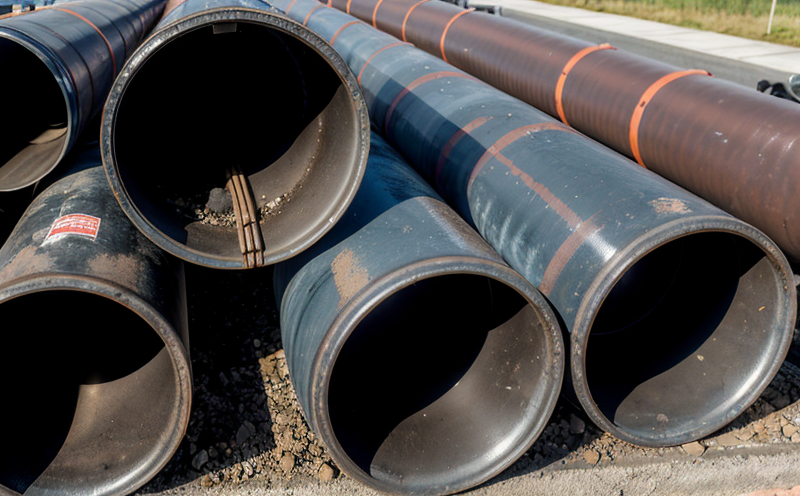UNE EN 12201-3 Testing of Plastic Pipes for Drinking Water
The UNE EN 12201-3 standard is an internationally recognized protocol that ensures the quality and safety of plastic pipes used in drinking water systems. This testing procedure is crucial for ensuring that materials meet strict hygiene, chemical resistance, and mechanical strength requirements before they are installed in public or private water supply networks.
Plastic pipes play a critical role in the distribution of potable water, and any contamination can have severe health implications. The standard outlines rigorous tests to evaluate various properties including hydrostatic pressure testing, burst testing, chemical resistance, and dimensional accuracy. These tests are essential for manufacturers, suppliers, and regulatory bodies to guarantee that only safe and reliable products enter the market.
The UNE EN 12201-3 protocol focuses on ensuring that plastic pipes can withstand the rigors of daily use without compromising the quality or safety of the water they carry. This includes testing for long-term durability under static pressure conditions, which is particularly important given the extended lifespan expected from modern plumbing systems.
Hydrostatic testing is one of the key aspects of this standard. It involves subjecting pipes to a continuous pressure over an extended period to simulate real-world usage. The primary goal here is to identify any potential weaknesses or defects that could lead to leaks or bursts in the piping system. This test is critical because it helps prevent water loss and contamination, ensuring that only robust materials are used.
Burst testing complements hydrostatic testing by simulating extreme pressure conditions beyond normal operating limits. This ensures that pipes can handle unexpected surges without failing. Chemical resistance tests further ensure that the material does not leach harmful substances into the drinking water, maintaining its purity and safety for consumption.
Dimensional accuracy is another important aspect of UNE EN 12201-3 testing. Precision in manufacturing ensures proper fitment within existing infrastructure, minimizing installation challenges and potential leaks at connections. This standard supports the seamless integration of new pipes into existing water systems without compromising the integrity or performance of the entire network.
The use of ISO standards like UNE EN 12201-3 is essential for maintaining high-quality benchmarks across different regions and industries. By adhering to these internationally recognized protocols, manufacturers can ensure their products meet stringent requirements set by regulatory bodies worldwide. This not only enhances trust among consumers but also facilitates easier compliance with local regulations.
In summary, the UNE EN 12201-3 testing procedure provides a comprehensive approach to evaluating plastic pipes intended for use in drinking water systems. It ensures that these materials are safe, durable, and reliable under various operational conditions. Compliance with this standard is vital not only from an ethical standpoint but also to protect public health by preventing contamination of the drinking water supply.
Benefits
The implementation of UNE EN 12201-3 testing offers numerous benefits for manufacturers, suppliers, and end-users alike. For manufacturers, it provides a clear roadmap to achieving compliance with international standards, enhancing their reputation and marketability. Suppliers can ensure they are delivering high-quality products that meet stringent safety criteria, thereby building consumer confidence.
From an operational perspective, adopting this testing protocol helps prevent costly failures in the field by identifying potential issues early on during manufacturing or installation stages. This reduces maintenance costs and downtime associated with repairing defective pipes after deployment.
The standard also promotes innovation within the industry by encouraging R&D efforts focused on developing safer and more efficient materials. Compliance fosters trust between stakeholders, including government agencies responsible for overseeing water supply systems.
For end-users, particularly those in residential settings or small communities relying heavily on municipal supplies, adherence to UNE EN 12201-3 ensures access to clean, safe drinking water free from contaminants. This contributes significantly towards maintaining good health and reducing instances of waterborne diseases.
Why Choose This Test
- Ensures compliance with international standards recognized globally.
- Provides peace of mind by guaranteeing product safety and reliability.
- Promotes trust between suppliers, manufacturers, and regulatory bodies.
- Encourages continuous improvement through rigorous testing protocols.
- Reduces risks associated with waterborne diseases due to contaminated supplies.
- Simplifies compliance processes for businesses operating across multiple jurisdictions.
- Maintains long-term performance and durability of piping systems under various conditions.
- Supports sustainable practices by promoting the use of environmentally friendly materials.
Use Cases and Application Examples
The UNE EN 12201-3 testing protocol finds extensive application across diverse sectors including municipal water supply, residential developments, industrial facilities, and commercial buildings. In urban areas, it plays a pivotal role in ensuring the integrity of large-scale water distribution networks. For instance, many cities worldwide have implemented this standard to upgrade their aging infrastructure, replacing old pipes with safer alternatives.
In smaller communities or rural regions where centralized municipal supplies may be limited, individual homes and businesses often rely on private wells or small-scale systems. Here too, UNE EN 12201-3 testing ensures that the plumbing components used are safe and effective at delivering clean water directly to taps.
For industrial settings such as factories or large-scale manufacturing plants, ensuring a steady flow of pure drinking water is crucial not only for employee health but also for maintaining production efficiency. In these environments, compliance with UNE EN 12201-3 helps prevent disruptions caused by faulty plumbing systems.
Commercial buildings like hotels, hospitals, and office complexes also benefit from this standard as they need reliable access to potable water throughout their premises. Hotels, for example, ensure guest comfort while reducing the risk of health hazards. Hospitals require safe drinking water in critical care units where contamination could have severe consequences.





